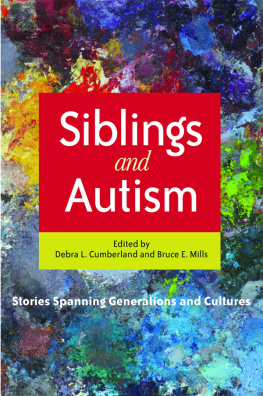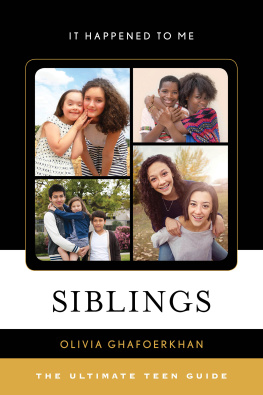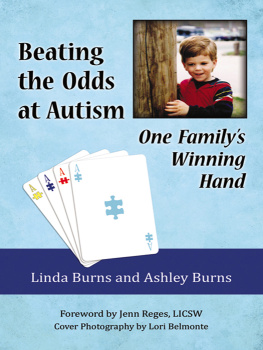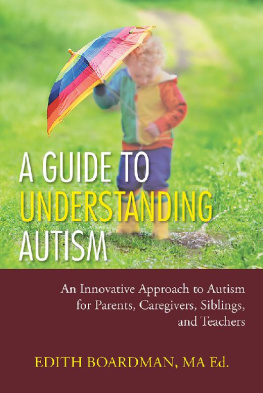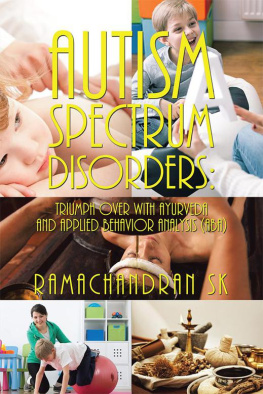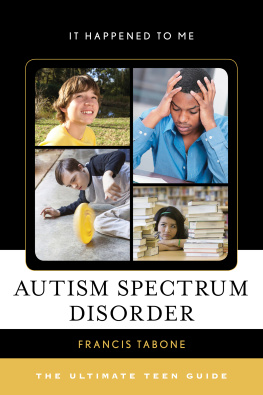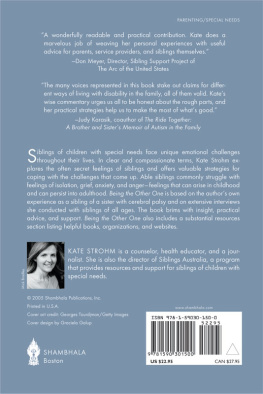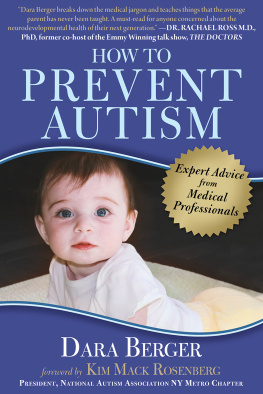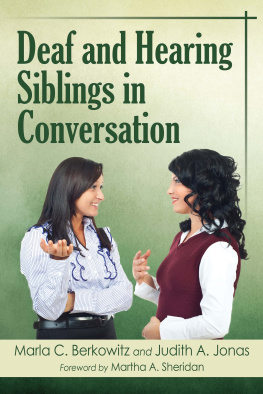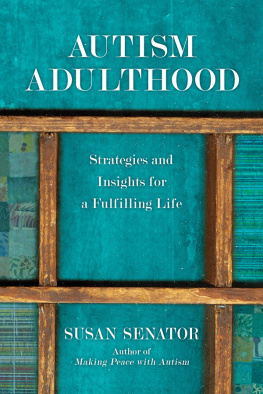Siblings and Autism
Stories Spanning Generations and Cultures
Edited by Debra Cumberland and Bruce Mills

Jessica Kingsley Publishers
London and Philadelphia
A version of Visiting Becky by Anne Clinard Barnhill was originally published in At Home in the Land of Oz: Autism, My Sister, and Me, Jessica Kingsley Publishers, 2007.
Debra Cumberlands Sirens originally appeared in Under the Sun 12 (Summer 2007): 818.
Parts of Katie Harrington Stricklins On the Way to the Sky appeared in Dougs Aria: A Sisters Note on Autism, published in Spectrum: For the Autism and Developmentally Disabled Community, April/May 2010, and is published with permission of Spectrum Publications (spectrumpublications.com).
Excerpts from William Faulkners The Sound and the Fury contained in Erica Naness Family Reasemblance come from the Vintage (Division of Random House) publication of the novel, and are reproduced with permission.
First published in 2011
by Jessica Kingsley Publishers
73 Collier Street,
London N1 9BE, Uk
and
400 Market Street, Suite 400
Philadelphia, PA 19106, USA
www.jkp.com
Copyright Jessica Kingsley Publishers 2011
All rights reserved. No part of this publication may be reproduced in any material form (including photocopying or storing it in any medium by electronic means and whether or not transiently or incidentally to some other use of this publication) without the written permission of the copyright owner except in accordance with the provisions of the Copyright, Designs and Patents Act 1988 or under the terms of a licence issued by the Copyright Licensing Agency Ltd, Saffron House, 610 Kirby Street, London EC1N 8TS. Applications for the copyright owners written permission to reproduce any part of this publication should be addressed to the publisher.
Warning: The doing of an unauthorized act in relation to a copyright work may result in both a civil claim for damages and criminal prosecution.
Library of Congress Cataloging in Publication Data
Siblings and autism : stories spanning generations and cultures / edited by Bruce Mills and Debra Cumberland.
p. cm.
ISBN 978-1-84905-831-5 (alk. paper)
1. Autistic children--Family relationships. 2. Autism--Patients--Family relationships. 3. Brothers and sisters. I. Mills, Bruce, 1958- II. Cumberland, Debra.
RJ506.A9S5266 2011
618.9285882--dc22
2010019256
British Library Cataloguing in Publication Data
A CIP catalogue record for this book is available from the British Library
ISBN 978 1 84905 831 5
ISBN pdf eBook 978 0 85700 295 2
eISBN 978 0 85700 295 2
Debra Cumberland
For my parents and for my brother
Bruce Mills
For Sarah Holtapp Mills
Contents
Acknowledgments
Debra Cumberland
Winona State University provided me with a sabbatical, which proved instrumental in allowing me the time to finish the project. I would like to thank my department chair Ruth Forsythe and my colleagues for their support. I would particularly like to acknowledge the assistance of Linda Kukowski and Kimberly Vogt.
Bruce Mills
I would like to thank Kalamazoo College for the sabbatical that, in part, contributed the time to develop the project and for the developmental money to advertise the call for essays. I am also indebted to those individuals who have graduated from or are currently attending Kalamazoo College, siblings who have shared their stories about life with a family member on the autism spectrum or with other physical or developmental disabilities: Sarah Bretz, Michael Tressler, Laura Mannion, Elizabeth Davis, Carolyn DeWitt, Claire Madill, Catherine Stover, Emily Bair, and Maddie Gillentine. Though it is hard to single out any one of the many wonderful students, I wish to thank Lindsey Fisch for initiating an independent study on sibling narratives and the joint learning that emerged from it. Finally, I am grateful for the help of colleague Dr. Babli Sinha who provided a contact for the Autism Society of India.
Deb and I both trace our investment in this project to the fall 2005 conference Autism and Representation: Writing, Cognition, Disability, sponsored by the Society for Critical Exchange and organized, with the help of many certainly, through the tireless efforts of Mark Osteen. For the many who attended, this conference brought forth and produced an empathetic scholarship that has led to enduring professional connections, personal friendships, and essential scholarship. In addition, we would like to thank Sandra L. Harris, Donald Meyer, and Vicki Forman, who, at early stages in this project, provided helpful advice and/or assistance in circulating the call for essays.
And, of course, we are indebted to Rachel Menzies and Victoria Peters at Jessica Kingsley Publishers for their helpful editorial assistance and for Jessica Kingsleys commitment to this project and the many other publications doing such good work in and for the autism community.
Introduction
Debra Cumberland and Bruce Mills
Debra
As a young girl growing up in Storm Lake, Iowa, I was struck by how isolated my family felt with respect to my brother. We seemed to be the only family in the world who had a child with autism. The books on my parents shelves, however, seemed to belie this factwe had the Noah books (including Josh Greenfelds A Child Called Noah and A Place for Noah), James Copelands For the Love of Ann, and Barry Kaufmans Son-Rise, as well as other, more clinical, texts. Once we even watched a 60 Minutes episode on autism, so I vaguely realized that there must be other people out there like my brother and that I could not be the only girl who had a sibling with autism. But it certainly felt as if I were alone, living in a small town in the 1970s. Sometimes people said, when I mentioned that I had a brother who was autistic, Oh, what does he paint? It would not be the first time that I encountered such confusion over the autism classification.
Classifying my brother also led to problems at school, where, here too, he did not fit in. At home, listening to my parents, I sensed their struggle to keep Adam in a regular public school classroom. We went to family therapy sessions in Cherokee, Iowa, which I hated, for I could intuit, even at a young age, that the psychiatrists there blamed my brothers autism on my mother. I, however, knew how much she loved him, knew that they were wrong, and could appreciate, every day, my parents sacrifices to keep the family humming along.
Until I went to a summer writing program at Carleton College in Minnesota as a high school student and made a dear friend who also had a brother with autism, I did not recognize what a dramatic difference it made to have someone to talk with, to understand the unique dynamic facing a sibling relationship with a brother or sister with autismor any other neurological or mental challenge. Prior to meeting this friend, I had felt that no one else had ever had this experience. Now, so many decades later, I have become increasingly struck by how hard it would be not to be aware of autism. Just driving down the streets of the town I live in, I regularly see billboards proclaiming how often a child is born with autismnow one in 150, according to a 2007 study by the United States Centers for Disease Control and Preventionor notice advertisements for autism spectrum disorder groups on the cable access channel or in the paper. Everyone I meet seems to have heard of the disorder, although his or her information may not always be accurate. There has been an explosion of parent memoirs, the most famous right now being Jenny McCarthys

